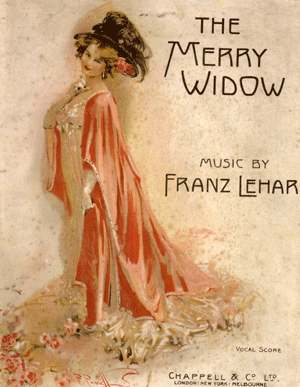This set of two well-filled
discs provides us with the best numbers
of these three operettas in French translation.
Both The Count of Luxemburg
and The Merry Widow have
good English 1960s versions on EMI and
modern 1980s versions on TER [ZCTEO1004;
ZCTEO1003], yet this 1960s set provides
good readings by Blareau. Frasquita
is seldom heard outside France, and
so this appearance is most welcome.
Unlike most of the Opérette series
recordings, this set contains no dialogue,
with three double LPs being transferred
to the two discs.
The Count
and Merry Widow need no
introduction for the collector interested
in operetta. Frasquita
is a later lesser known work (written
in 1921) which was not so successful.
It was a full ten years before a French
version appeared with Fanély
Revoil in the title rôle in 1931.
Lehár then provided an enlarged
score for its Paris opening at the Opéra-Comique
in 1933. The same André Balbon
who features in this recording also
took part in that Paris premiere. That
French production was equally disappointing,
playing for a mere four weeks. Lehár
was an admirer of the Zarzuela and a
strong Spanish influence is evident
in the Frasquita dances
although they are omitted from this
recording. Frasquita is
principally remembered for its serenade,
'Hab ein blaues Himmelbett', a hit song
brought to prominence by Richard Tauber.
Collette Riedinger
engages herself enthusiastically in
her roles yet has a brittle top in forte
passages; at other times she conveys
much warmth. Annick Baugé turns
on her sensuous charm from the outset
with velvety tones, while Robert Destain
commands a strong presence in their
Act I fast march duet, 'Puisqu'il vous
plait'. Bernard Alvi sings well, and
although Balbon injects a good personality
to his parts, he is now past his best
and disappoints with a harsh delivery.
His 'J'ai le coeur plein' in The
Count of Luxemburg is badly
written and untuneful to the ear. The
large atmospheric choral openings to
all three Lehár operettas are
impressive and anticipate the colour
of the music that is to follow. Frasquita
in particular contains much variation
of style of writing.
Throughout, Blareau's
vivacious pace releases the energetic
scintillations of each score, particularly
noticeable in The Merry Widow.
Although the orchestra is rather recessed,
it keeps up with the conductor's drive.
The notes are provided
only in French.
Raymond J Walker


